#like i eat and i think of palestine i think of the children starving to death in gaza i think of people making bread from CAT FOOD
Text
what kills me is how people here in the west are so …. willfully, blissfully, ignorant of what’s transpiring in palestine. like i have even seen poc, even seen HIJABIS still buying starbucks and i’m like …… i guess dumbfounded at this point. “oh but it’s just one drink” “oh but my one dollar won’t make a difference if i spent it or not” “well it’s not my problem, the middle east is always at war”
are people so arrogant they think they are the exception to what’s happening in palestine? in fact. the victim blaming against the palestinians is insane “well they should’ve just left” “well they should’ve agreed to a ceasefire” “well they shouldn’t have let hamas take over” you guys make me sick to my stomach!!!! my god this rhetoric is so narcissistic it hurts!!!!!
#like i eat and i think of palestine i think of the children starving to death in gaza i think of people making bread from CAT FOOD#i sleep i think how i can’t sleep unless my dog is warming my feet or i wake up groggy without my humidifier#people in gaza can’t even sleep they can’t even rest the killing the violence doesn’t even stop for a minute!!!#i wear my expensive clothes i do my makeup i do my hair i wear mt perfume and i want to cry thinking that like#are the women of gaza not worthy? do they not deserve this level of luxury or happiness?#will the little boys and girls of gaza ever get to play with their moms makeup and ruin it in the process?#i don’t know how anyone can let anything else consume their minds these days#shame on you. may your time also come. may the world look away in remembrance of those you scorned#from the river to the sea palestine will be free#free palestine#free gaza#free the west bank#occupied palestine#israel is a terrorist state
40 notes
·
View notes
Text
You know what hits me hard? When 5 to 6 year old children, all the way in Southeast Asia, knows about what's happening in Palestine right now. That children their age is getting bombed, that they're starving to death, that they're getting shot at, and sniped in the head. Because, just this past 2 or so months, I heard some of the little ones in the Kindergarten classes I'm TAing in as an Intern talk about it. Hell, one of the little boys downright said he didn't like Israel, because Israel is bad, because they do scary things. Another was questioning whether Palestine was bad too, because, "why else would they shooting at them?". A little girl in one of my classes doesn't want to finish her food at all, because she wants to save at least half her meat and rice for kids in Palestine, because she heard that, they don't have food.
And that's just the ones I remember. Namely the inciting cases before their classmates slowly follow suit. The littles are fricking SCARED. We had to sit these kids down, and tell them that the topic is too mature for them at the moment, that they shouldn't even be concerned because they're KINDERGARTNERS, they're not even old enough to properly understand. The one teacher I was TAing for had to make a class announcement saying that.
What gets me is, these are 5 to 6 year olds, the youngest I've worked with in this specific age group is 4. 5 years old on average, and they've already been exposed to the worst horrors genocide has to offer through the news and snippets of conversation among adults and hell, considering how many of them say they like to play games on Mama's phone, or their IPad, even from fricking social media.
And the fact that, these literal babies, from all the way in Cambodia, has more empathy in their entire body and soul, than full grown fricking adults have in the nail of their pinky finger, gets me. FFS we as adults could LEARN from them I feel sometimes. I honestly don't know what to feel about it anymore. On the one hand, this is the next generation I'm working with. And if the next generation's default response to a tragedy such as Palestine, is what I've seen come up on occasion so far? Perhaps there's some bloody hope for this world after all. At least in this country. Especially since a majority of them already come from families who survived a genocide. These are the 3rd - 4th generation descendants of those who survived the Khmer Rouge. They've got grandparents at home, who no doubt are more than intimately familiar with what Palestine is going through right now. And it shows.
But on the other, it makes my heart sink because these are CHILDREN, these are LITTLE KIDS, they should be playing with their toys and watching cartoons and talking to their friends about everything from Spiderman to Speakerman to Kuromi and her friends, and be worried about whether or not they can go to playground that day, guranteed they're well behaved, or if Mama remembered to pack in their costume for swimming lessons that week. NOT JUST MY KIDS. But the little ones in Palestine too. They deserve better. They all deserve, so much better. Hell, it's come to the point that whenever I look at my kiddos right now, whether they'd be working in class, playing, doing something as mundane as eating lunch or getting ready for their nap. I think of the children their age in Palestine that didn't even get the chance to survive. I think of the ones whose memories from this age, is nothing but absolute horror and pain, rather than what has slowly become my normal, who never got to experience what my littles do on a daily basis right now.
Children shouldn't even be concerned about "War", about a Genocide. The last thing that should be on a 5 year old's mind, is pain, and suffering, and the worst horrors imaginable ever to be inflicted on a human being. ESPECIALLY WHEN IT'S INFLICTED, ON OTHER CHILDREN THEIR AGE. And for that alone, the world has failed them. Especially the kids in Palestine who didn't ask for any of this. They just wanted to carry on with life as kids do, the same way as my littles do on a daily basis no doubt, learning, playing, chatting with friends over their favourite cartoons and characters, worrying about whether they'd get to go to the playground or not that day.
I apologize for talking about this on this blog. I know my blog tends to be lighter in feel, a lot more unhinged and light hearted typically. I mean, I'm just a fricking nerd who likes to draw and write, and lurk about her favourite fandoms to consume and support what is shared among other nerds who also like to draw and write. But I couldn't stop thinking about it. About contemplating it, especially since I'll be back on a roll tomorrow, working with my kiddos again after not seeing them for 5 days straight because of Holidays. And, I just had to talk about it. This is something I felt I couldn't keep to myself this time, I don't think my soul'd be able to carry it. I had to talk about it.
FREE PALESTINE. Our children deserve better.
#free palestine#gaza#palestine#rafah#israel#current events#gaza strip#human rights#childrens rights#save the children#cease fire in gaza#cease fire now#cease fire permanently#palestinian genocide#support gaza#pray for palestine#ceasfire now
7K notes
·
View notes
Note
I’m a bit confused abt your hunger strike. I absolutely support Palestinian liberation and understand the point of protest (violent or otherwise), including the self immolation of Aaron Bushnell. What I don’t get is what your hunger strike would like, do? In Bushnell’s case, specifically being a military member publically doing this act of extreme protest can have a clear impact (at least to the public, maybe not policy), but I’m genuinely not sure what a random person on tumblr deciding not to eat for a few dags in the name of Palestinian liberation is supposed to accomplish. I hope this doesn’t come off as too antagonistic, I just don’t get it
I feel like I explained it pretty well in my post that I am doing this for personal reasons and for my own beliefs. Obviously there is no end result where someone says “Okay Ibtisam, now they you’ve been on a hunger strike for 15 days things will change!” This is for solidarity for those in Palestine that have no choice but to starve, and it’s a way to raise money for Anera which is an organisation that is currently getting food into Gaza right now. I just see the photos that keep coming out of children that have not eaten in months while I know that I can eat 3 or more meals a day without even thinking twice. We are all taking so much for granted right now, and if I have an opportunity to change that why wouldn’t I?
If you don’t feel guilty everyday and have the urge to do something about it, then that’s on you I guess. I’m not demanding or asking or even wanting everyone in the world to go on a hunger strike because I am, but I am asking why it’s so hard for you to understand why I would even want to do something like this.
Here’s a link for you to donate to Anera
70 notes
·
View notes
Text
Sunday, April 7, 2024
What a privilege it is to be able to eat sahur and iftar every single day because unlike Palestinians, we have more than enough of foods and drinks at our fingertips. Never in a moment did we ever experience what being starved to death feels like and yet some of us are still occasionally complaining how "boring" our meals are, that we feel unsatisfied with what's available on the table and desperately want to try out that newest restaurant, and that we hardly ever feel grateful for what we have. Palestinians are literally dying because as the direct result of forced starvation imposed by Israshit and here some of our dustbins are filled with wasted foods.
What a privilege it is to clean a classroom/house made dirty by healthy kids playing, because unlike Palestinians, we have no single clue what it feels like to see children being blown up into pieces after their house getting bombed by Israshit. We get frustrated hearing kids screaming and crying but those Palestinian mothers are wishing their kids were still alive so that they can hear their voices one more time. We yell at our kids for playing and making a mess 24/7 and those Palestinian mothers are weeping buckets of tears because they know their kids that have been killed can never go back and play together with them again.
What a privilege it is to do piles of laundry because we have a plethora of clean clothes to wear every day. Some Palestinians don't even have enough and proper clothes to protect them from winter and yet here, some of us feel unsatisfied and we wish we can buy some more clothes because of social media influence despite the fact that we have a wardrobe (or two or three) wardrobe filled with miscellaneous skirts, t-shirts, pants, dresses, veils and so forth. We never feel enough, we always want more and more and more.
What a privilege it is to be able to taste the sweetness of education. Our kids are able to school every single day and we can learn things on our own from the internet but what about Palestinians? Their schools and universities have been turned into dust by Israshit and they definitely can't pursue their formal education anymore. But you know what, irrespective of what all they've lost, they never give up. The other day I watched a video in which an old woman patiently teaching Gazan kids how to read in a fucking tent. If during the genocide Palestinians still have the spirit and determination to teach and study, then what excuse do we have to not keep trying to educate ourselves and other people about Palestinian cause?
What a privilege it is to have a cozy bed and sleep soundly in our safe home because unlike Palestinians, we don't have the fear of the freaking bombs being poured down from the sky and getting crushed by the rubble of our homes. We are safe, but Palestinians have to constantly live with the fear of being shot at, slaughtered, killed, bombed, kidnapped, tortured and any other atrocities you can think of. We are safe and we have all we need, but we haven't been able to be a good ally for Palestinians and be consistent in doing the things that need to be done for Palestinians.
Why? Why don't you try harder and harder to spread awareness? Why don't you want to ask more questions and learn more about Palestine? Why don't you want to be all in and support Palestinians in any shape or form? Why can't you spur yourself into doing more? You know you can be better than that but what's stopping you? Why can't you write things about Palestine regularly? Why are you afraid of speaking up? Why don't you put in the effort to try to reach and educate more people? You know in order to help Palestinians reach liberation we need to be united and do things collectively in a sustainable way, so tell me, why don't you try to braver and speak more and more and moreeee? Why can't you confront those people who remain silent and indifferent about a fucking genocide against your own people? Why after all this time you still get distracted easily? Why can't you be focused and give your all for this noble cause? Why? Why? Why?
#i stand with palestine#free gaza#free palestine#gaza#gaza genocide#gaza strip#gazaunderattack#palestine#stop the genocide#israel is an apartheid state#israel is committing genocide#israel is a terrorist state#writing#writers and poets#writers on tumblr#poetry#deep thoughts#deep feelings#love#life#self reflection#you can do it#from the river to the sea palestine will be free#human rights#israel is a genocidal state
21 notes
·
View notes
Text
NGL y'all, it's been rough.
On the surface, I guess you could say I'm doing alright. I have a roof over my head, adequate food to eat (most of the time), good friends and family to rely on...
But when I say this world has beaten me down to pieces, it definitely has.
COVID was the first chink in the armor. Watching the entire world basically shrug off mass death and try to blithely live like it's still 2019 despite a pandemic raging worse than ever with less protections than we had before is wild. Don't matter how much facts you have to show to people, they will ignore it and then also in the same breath wonder why everyone's sick all the time. I mourn the children who aren't protected, who are sent into schools with no masks to become disabled/chronically ill for the rest of their lives. I mourn the immunocompromised who are trapped indefinitely in their homes because the world has moved on from pretending to care about COVID.
It's been 4 years. Time doesn't even feel real.
Then October 7th happened, and I get to watch a genocide happen in occupied Palestine in real time. Now, if you don't know me, then you may not know that I generally avoid rated R live action movies because I am a wuss and can't take the explicit violence and gore in a lot of them. I went from that, to watching lives of Palestinians recording their loved ones blown up, carrying their remains in plastic bags, IDF psychos shooting women and children in the back, the despair and anguish of Palestinians being corralled, starved, poisoned just because they exist.
I have irrevocably been changed by bearing witness to this horror. Writing my script for my game has slowed down to a crawl. I close my eyes at night to sleep, and dream about the devastation I witnessed. I wake up and see even worse horrors, all unchecked by world powers.
I get on Facebook and see people carrying on with life as if nothing is happening at all.
I don't... I feel like I'm looking at society from the opposite side of a glass window. Everything has lost its color. How can I care about movies, video games, traveling, etc when it all just serves as a distraction to the ugly reality that cannot be ignored? I don't care about celebs and their drama. I don't care about the regurgitated mess Hollywood puts out. I don't care about what overpriced AAA game is highly anticipated. I do not care at all.
The climate is fucked up and I see venture capitalists literally selling pieces of iceburgs to rich folks in the UAE for cocktails like it's nothing. People wanna talk about what new restaurant opened up and all I can think of is the fact that a singular bell pepper is like $2. A musical artist announces a tour and all I see are more superspreader events where people won't mask then bring home viruses to their families.
Is this the future we want? Hell, will we HAVE a future?
We, collectively, will rue the day we sat around and did nothing to stop all of this. And I fear that day will come very soon.
#sorry to get so deep on main but it's weighing on me heavy#I'll get my game done at some point because I have my team to worry about and I will not let them down#but my heart is just... not in it anymore#the world needs to heal and needs to change and quickly otherwise none of this other shit will matter
15 notes
·
View notes
Text
i havent been on here lately since i have been using twitter to keep up with information. my blogs have been on queue but i of course reblog things when im back here to spread help/info.
i keep checking twitter to see if the palestinain people that i follow are still alive. reporters, doctors, any palestinian person just hoping to see that they are still alive.
ive been thinking about noury and her mother and hoping they are alive. ive been thinking about the multiple tweets where reporters and doctors are fearing that today might be their last day alive. ive been thinking about every person ive seen in videos. ive been thinking about every person i havent seen in videos.
ive been thinking about the missing and the murdered people who are beyond recognition of when they were alive where we dont know their names and stories.
ive been thinking about the doctors who reported surrounded by dead bodies. ive been thinking about children who spoke in english to the world begging to let them live. ive been thinking about the babies who didnt even make it to a year old.
i see a child and i think of the children of palestine without parents, who dont know their names, who are being starved, who are dying in the cold and the bombings and the snipers. i think of the 9 year old palestinian child who reports the genocide of her people instead of playing pretend with her friends in a safe home.
like a post ive seen before: i drink and i think of palestinians who have no water and are dying from thirst. i eat and i think of palestinians who are being starved to death. i feel cold and i think of palestinians who are dying from cold with no home to return to.
3 notes
·
View notes
Note
Getting whiplash from the Israel supporters going from “how dare you make excuses for terror” to “yes we’re going to starve and carpet bomb 2 million people to death, including children, cry about it” in less than a day.
PLEASE dont even get me started on the israeli/palestinian conflict. people and their opinions got me feeling like im the only one out of my sane mind. idk where you're from but here in germany they're starting to fine and sanction whoever joins manifestations in support of palestine. they're framing these perfectly lawful and peaceful gatherings as "pro hamas", when actually the protesters are just calling for the decolonization of palestine. like???? what the fuck??? when did we get to the point where we not only make amends for colonization but we encourage/fund it even???? i advocate for a variety of causes on my social media accounts, but never ever in my life I've witnessed the entirety of western society being so united and unanimous in their support of settler colonists who openly practice apartheid, ethnic cleansing and other means of torture to secure their hold on a territory that they literally have no jurisdiction or claim over. it's.... just baffling. and the crazy double standards the international community applies when it comes to reading and analyzing this war are simply far-fetched, prejudiced and intentionally blind. i truly cannot make a sense of it for the life of me. like, dont get me wrong, i dont think the conflict in itself is overly complicated and way too hard to pin down, far from it, i feel that painting it as too complex for the ordinary person is just one strategy to gatekeep it and make sure that thinking people don't question the dominant narrative and rationalize what is actually happening there and has been happening for the past 70+ years. because yeah... saying that hamas is a horror born as a consequence and in retaliation to an even greater horror is seen as controversial and pro-terrorist. saying that israel is an ethnocracy led by far right war criminals and is therefore not entitled to the occupation of palestine is seen as antisemitism. zionists control the narrative as much as they control who lives, who dies, who gets to eat, or who can have electricity and running water, and you can bet anything that they're gonna make the palestinians look like bloodthirsty, aggressive, ruthless warmongering terrorists, aka just the perfect cartoonish convenient villain they need in order to lend their colonization of those lands even more credibility and legitimacy. and the international community is of course on board with all of that
#i would say much much much more but my bus stop is almost here#im literally seething#also i feel guilty about not answering so many other asks that have been sitting in my inbox for days now#im sorry guys. i just had a lot of thoughts about this one particular issue#it truly struck a nerve with me#but i read all of what you write and i pinky promise I'll reply to all as soon as i have a little extra time on my hands#ask#anon#anonymous#palestine
4 notes
·
View notes
Text
I walk to work and think of Palestine.
I pass through quiet suburbs, a coffee shop on the corner. I think of the ruins of bombed buildings I see on Instagram from all the Gazans I follow. While my suburb never looked like the before pictures (different climate, different density) I can't help but imagine my home bombed, the roads blocked with broken and bombed cars. Bodies in the street, rotting. My pet cat, feral now, eating the corpses to survive. The small border collie I pass eating the bodies of the dead too.
What would it smell like? Surely no longer the crisp morning air. Maybe dusty. Maybe like the fire that burnt the cars. Maybe like death. How bad does a body in the street smell? Can I smell the bodies crushed under the rubble of their homes? Are the sewer pipes burst?
I get to the section of main road I walk along, cars driving in both directions on school drop offs and to get to work, or maybe from work for those on night shift. The schools in Gaza are closed now. No daily routine for the children. Just terror. Schools bombed. Children killed. Orphans alone. Orphan amputees. Who cares for these children? When will they be able to return to school?
How can I even work during a genocide? I am a world away. My streets are peaceful. My government is still complicit - they've supported Israel with evidence that screams and pleads them to not (the images of dead children, dead people, starving people, crushed people), and punished the people of Gaza on rumours. How can my normal life continue?
I come to a park. The sound of traffic quiets as I walk by the trees and see green, green, green. I think again of the grey streets. The blackened bombed areas. The rusty colour of blood stains. The white funeral shrouds. There isn't much green in Gaza now. It's been bombed, bulldozed, razed. It's been covered in rubble and blood.
There isn't much quiet in Gaza either. The drones fly all the time. Explosions. Screams from the wounded. Wailing of those who have lost loved ones (or everyone).
I get to the office. I don't know how to respond when someone asks how I am. I'm fine. Compared to Palestinians, I have nothing to complain about. I go to sleep feeling safe. I wake up without being crushed by my roof. I walk to work. I eat my lunch. I have showers. My cat isn't eating my corpse.
Is everyone else like me? Unsure how to respond, how to discuss how weird you feel having a normal life while across the world thousands (30,000+) people have been killed by an army your government supports.
0 notes
Text
Progress in Food Production Illustration
In 1968, when I was and impressionable six years old horrified by what the television was showing about the Vietnam War, listening to the Beatles sing 'All you need is love', my parents bought a book called "The Population Bomb" by scientist Paul Ehrlich. It suggested that we were running out of resources because our population was growing too fast and we were consuming our earth's life support system faster than it could
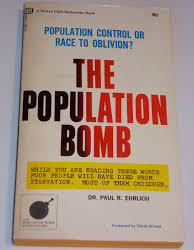
regenerate. Two years later, on the first Earth Day, I began my activism, rounding up the neighborhood kids and staging a clean up of the
polluted stream behind our apartment that ran into the Hudson River.

A year later my Beatle idol George Harrison held a "Concert for Bangladesh" to raise awareness of the suffering there. Like many kids worried about the "starving kids in Bangladesh" I asked in school why things were getting so bad. Like most school children around the world, we were told how the population bomb supposedly worked, how it ticked. The idea went back to the Reverend Thomas Malthus who argued in 1798 that "population increases geometrically, while food supplies increase only

arithmetically". This has been the prevailing wisdom for over 2 centuries and is often illustrated by the following graph:http://www.biology.iupui.edu/biocourses/N100/images/ageomgrowth.gif
http://occ.crescentschool.org/geography/human/unitvagricultural/malthusgr aph.jpg
Looks neat, right -- so mathematically precise and inevitable.
The problem is that it is wrong.
I felt it as a kid. It bothered me throughout middle school and high school and on in to college.
The reverend's now famous "Malthusian" predictions of doom and gloom came from a man who never studied biology... we now realize that he was a religious zealot and bigot who made up theories to try and stoke anti- immigration fever, arguing that undesirable poor people were basically breeding like rats.
The problem in his logic is easy to spot when you use Nexus thinking:
FOOD IS A POPULATION.
Food comes from living creatures who have populations. They expand GEOMETRICALLY. If you let them. If you encourage them. It doesn't matter if we are talking about Brewer's yeast or earthworms or oak trees or apple trees or chickens or ears of corn or cattle or cocoa covered ants... whatever you eat comes from living organisms that are programmed to reproduce as fast as they can... that WANT to reproduce... geometrically. Just like us. So... population increases geometrically, whether it is us or our
food. Starving kids in Bangladesh or Ethiopia simply shouldn't happen, and, I will insist to you, WOULDN'T, if we allowed the organism we eat to do their thing.
The key to keeping food production in line with food consumption, I have been arguing, is to use the "food-waste-to-fuel-and-fertilizer-and-food" or FW2F3 formula wherein every molecule of nitrogen, phosphorous, pottasium and carbon and micronutrients found in our wastes in our burgeoning cities is transformed immediately, in situ, back into food through the magical transduction of anaerobic and aerobic biodigestion and urban vertical farming and micro-livestock.

Using these simple techologies to close the loops in the food/energy/water nexus, the curves on those graphs should continue to go up in lock step, until we reach the limits set by sunlight. And then we will have to figure out safe, harmless ways to grow not just ourselves and our "economy" but our ecology, and eventually help grow new planets. But even that... the promise of space stations and terraforming planets, isn't out of the question. After all, the one thing that doesn't seem to ever be in any danger of NOT expanding... is the universe."
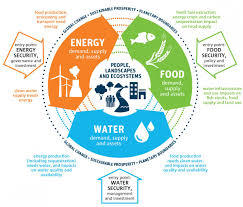
Today’s lecture is about “Progress in food production: a new wave of ancient practices and post-modern technologies that use less water and less energy, produce less waste and can even produce more energy.”
And I believe, to paraphrase Deuteronomy 12:3, we have to start by “tearing down the altars and smashing the sacred pillars” that were erected by wrong headed Malthusians who used a gross misunderstanding of biology and a total lack of nexus and systems thinking to scare us into what I call “induced paralysis for profit”. The idea comes from what is called in economics classes “The Scarcity Model: the fundamental economic assumption of having seemingly unlimited human needs and wants in a world of limited resources, which states that society has insufficient productive resources to fulfill all human wants and needs”.
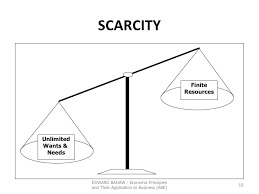
When the scarcity model is used to create fear, to create an atmosphere of doom and gloom, to predict the inevitable arrival of the four horsemen of the apocalypse (Conquest, War, Famine, and Death), political economists and political ecologists suggest that it is much easier for elite groups to manipulate the masses. They control the machinery of conquest and war, and they use the specter of famine to gain their power.
Food production sits at the heart of the nexus – every animal on this planet (and doubtless the vast majority of beings in our universe) finds food to be the fundamental. It is priority number one, for unless you are a being of pure light you need the food that grows with light to survive. And if you spread misinformation that famine is imminent, that starvation is just around the corner, you can mobilize armies.
However, looked at from a FEW Nexus perspective, this fear of famine we
have been living with since Biblical times (the four horsemen are part of the Book of Revelation of Jesus Christ to John of Patmos, at 6:1-8 in the New Testament written during the Roman occupation of Palestine) is a peculiar Middle Eastern and North European phenomenon it turns out, coming from civilizations in regions of the world where water stresses constrained food production. People in well-watered tropical regions rarely felt threatened by food scarcity and in fact were described by anthropologist Marshall Sahlins as living in a state of perpetual abundance. He postulated that hunter- gatherers were, in fact “the original affluent society” at a symposium entitled "Man the Hunter" in 1966 and this idea has been tested and found true for most peoples around the world where water was not a limiting factor. It explains why hunting and gathering and subsistence farming persist to this day, and why so many people resisted being brought into modern civilization or adopting modern agriculture methods. In fact the work of historian Anthropologist Eric Wolf, such as “Peasant Wars of the Twentieth Century” and Yale professor James Scott in books such as “Seeing Like a State: How Certain Schemes to Improve the Human Condition Have Failed” teach us that there have been enough failures due to the form of agriculture that emerged from the conquering civilizations that the conquered were willing to sacrifice their lives to revolt against them. Somehow, it seems, those certain schemes to improve yields were social and ecological disasters that should have been rejected by civilizations but instead were used to confirm the Reverend Malthus’ scientifically unfounded hypothesis – a classic but often neglected example of what is known as confirmation bias – which wiki defines as “the tendency to search for, interpret, favor, and recall information in a way that confirms one's preexisting beliefs or hypotheses, while giving disproportionately less consideration to alternative
possibilities”. When it comes to food production, the alternative possibility, which is persuasively argued in Richard Manning’s book “Against the Grain: How Agriculture Has Hijacked Civilization” is that monocropping annual vegetation and basing civilization on grain agriculture, on the use of plants in the family Poaceae/Graminae, that is the grasses – wheat, rice, corn, barely, oats and sugar – yes, sugar is a grass – is, to caricature the 45th president of the world’s most powerful agriculture and military empire, “ a disaster”.
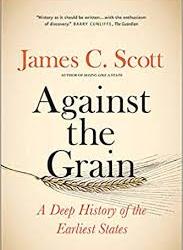
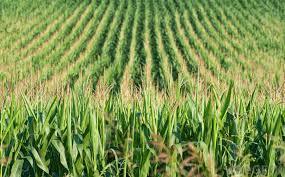
History records that agriculture and famine are the Jekyll and Hyde of the long and often militarized march of civilization. The one came because of the other, says Manning. Most of us were taught the opposite weren’t we? Taught that human life, as the 17th century imperial philosopher Thomas Hobbes decried in his book Leviathan, was “nasty, brutish and short” We were told that humans lived in a state of semi-starvation UNTIL they discovered agriculture. We were told that agriculture saved our species from hunger and misery, gave us the surpluses that enabled our climb to civilization. Sounds good, turns out not to be true.
Even Harvard’s Spencer Wells, a friend of mine who is the geneticist who leads the National Geographic Genographic project writes in his book “Pandora's Seed: The Unforeseen Cost of Civilization” that when humans shifted from hunting and gathering in that original affluent society to grain agriculture the average height of men dropped from about 5 foot 7 to 5 foot 2 and women’s pelvic girdles narrowed to the point where death in childbirth increased in frequency.
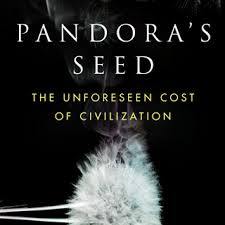
These were clear signs of malnutrition recorded in the fossils. Agriculture was to blame... floodplain agriculture dependent on disturbance species that grow like weeds after a disaster because they are weeds. And they end up causing disasters thereafter because they evolved to live in disaster environments, places where floods and fires ravage the countryside on a regular basis. In effect they DEPEND on disasters for their own reproductive survival. It is as though once we hitched our caboose to the weeds and became weed eaters, we started living for them and not the other way around.
Michael Pollan talks about this in his wonderful book that reframes our relationship to addictive plants called “The Botany of Desire”.
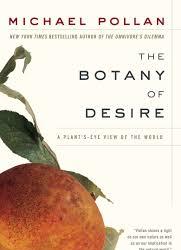
He points out that you could look at us as the slaves of addictive plants that evolved to control us through their effect on our brains so that we would help them reproduce. This idea, which British Scientist Richard Dawkin’s calls “The Extended Phenotype” in the battle of Selfish Genes, isn’t really new.
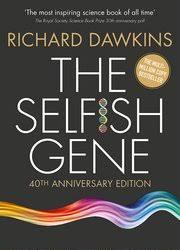
In 1872, when Samuel Butler published his utopian fiction “Erewhon” the major premise of the people who fled Europe to live on the island of Erewhon in the hopes of creating a better civilization was that they would not allow themselves to submit to the control of their addictions or any system that makes us into its own slave. On the island they refuse to use technology like cars and steam engines and typewriters and telegraph or any
machines. It isn’t that they don’t know about these things – in fact they have an entire museum where they keep them safely on display in glass cases. They tell visitors, “in your civilization machines don’t serve you, you serve them. You go to work in the morning and waste your days slavishly building more machines and oiling them and fixing them and keeping them running. It is like the bee that is the servant of the flower... flowers can’t move to reproduce themselves, so they addict the bee with beauty and nectar and perfumes and the busy bee spends its whole life toiling just to help make more flowers”. The phenotype of the bee is being controlled by the genes of the flower, not the bee. This is the concept of the extended phenotype, which finds its purest expression in parasitology.

So there are some who believe that the crops we turned to in our modern agricultural systems are acting more like Parasites that food stuffs, and that when we think we are serving food in the “restaurant service” sense , we literally are serving food – i.e. we now serve THEM, as servants.
This makes sense from the perspectives of evolutionary psychology and behavioral ecology.
Whether it was drought in arid desert regions or winter freezing water into ice, the limits to plant growth and reproduction, and hence to animal fecundity were set by the availability of water. In the Middle East, certainly, it was not energy that was missing from the Nexus. Sunshine has always been abundant in those latitudes to provide energy for food production.
In the European countries the harsh winters did indeed constrain plant productivity and famines could result in winter if care wasn’t taken to take the enormous fecundity of the spring, summer and fall and store the harvest surplus for the fallow period. But Hunter Gatherers North and South, in the cold regions or the hot ones, originally depended on agroforestry, on tree crops, on perennials, not annuals. And they depended on the animals that depended on forests – on forest boars and jungle fowl and woodland ungulates – all the ancestors of our modern pigs and chicken and cows. In the north the forest leaf fall in the fall built up incredible rich soils during the winter ready for an explosion of food in the spring and summer which created enough surplus for the mammals we ate to survive the winter. In the south the forests retained the water that fell sporadically and created their own microclimates through transpiration. They forests created environments so rich in the cornucopia of foodstuffs that our mythology now recalls as “The Garden of Eden”.
And if you want some mythological proof of the disaster or agriculture, just look at the curse we were to endure after eating the tree of knowledge and getting kicked out of the garden,
“To Adam he said, "Because you listened to your wife and ate fruit from the tree about which I commanded you, 'You must not eat from it,' "Cursed is the ground because of you; through painful toil you will eat food from it all the days of your life. Both thorns and thistles it shall grow for you; And you will eat the plants of the field; 19By the sweat of your face You will eat bread, Till you return to the ground”. So eating bread isn’t salvation, eating bread is the CURSE. No wonder so many hunters and gatherers said, “shoot, I’m going back into the forest, no way I’m doing hard time through painful toil to eat when I can pick fruits and vegetables and trap
animals.” And the fossil evidence of malnutrition affecting the pelvic bones of women, noted by Spencer Wells in Pandora’s Seed, is corroborated in the curse in Genesis when God says, “To the woman he said, "I will make your pains in childbearing very severe; with painful labor you will give birth to children. Your desire will be for your husband, and he will rule over you."
We can even comment on what this reveals about the emergence of patriarchal rule due to the shift to grain agriculture. My experience with hunter-gatherer populations is that the women are usually the ones who
understood the sheer abundance of biodiversity that nature offered to put into the cooking pot. I experienced it when I was living with Melayu
and Dyak tribes in the rainforests of Borneo and was taken into the forest by the medicine woman who was cooking our meal and her grandson who climbed the trees to get the foods. She was called the “witch doctor” and as she laid out the huge variety of foods we collected to put in the cooking pot I had images of the witches’ cauldron with its “eyes of newt, frogs legs, bats wings” – all things that would have provided great inexpensive abundant protein but which today are shamefully associated with evil and
witchcraft. After all, women were BURNED at the stake for understanding and promoting biodiversity in diet by the European patriarchy, and children punished or mocked for thinking they could go into the forest as kids do and come back munching on lizards and grubs. Agriculture can be blamed not only for this tremendous patriarchal violence and loss of biodiversity as we simplified the landscape to a handful of weedy grasses, but for what James Scott calls the “dummification” of humanity. At one time, as I experienced among the hunters and gatherers of Borneo, harvesting food was an educational adventure that made women and children experts who rivaled the best Ph.D. botanists and naturalists who Harvard sent out. With agriculture we turned brilliant self-sufficient peasants into outdoor factory workers and, of course, quite literally when you are talking about the first 400 years of agriculture in the European colonized Americas, slaves. The violence inherent in agriculture rears its ugly head everywhere.
And it could be said that Genesis itself records the clearest indication that grain agriculture is the scourge of mankind, the source of its original sin of violence in The story of Cain and Abel. This chapter of the Bible is the clearest indictment of wheat agriculture one could imagine, and nobody seems to comment on it. Abel is a pastoralist who tends a flock of animals who wander about like ungulate hunter gatherers, eating what God has given them. His brother Cain is... a wheat farmer, somehow stupidly living out God’s curse to scratch a living in the hot sun through toil amidst the thistles and thorns that always accompany weed agriculture. Abel brings a lamb meat sacrifice to the altar of God, along with diverse fruits and vegetables he has gathered, and God is pleased.
Cain then comes with a bunch of wheat and the Bible says,
“but for Cain and for his offering He had no regard. So Cain became very angry and his countenance fell. Then the LORD said to Cain, "Why are you angry? And why has your countenance fallen?7"If you do well, will not your countenance be lifted up? And if you do not do well, sin is crouching at the door; and its desire is for you, but you must master it."...
To me this is a clear indication that the ancients saw wheat offerings as a kind of sin, the sin of an addiction, an addiction which Cain could not
master. In his anger he turns around and kills his gentle carnivorous animal slaughtering brother.
Think about it for a moment... it is enough to make Vegans go mad: The vegetarian is the killer, the slaughterer of baby goats is the gentle one.
Could it be that this ancient myths were there to warn us that wheat is a weed, that grains are drugs, that we haven’t been growing food all along, but addictive substances that will end up mastering us through the Botany of Desire?
So, to get back to Reverend Malthus, who in my opinion must not have spent an awful lot of time delving into the hermeneutic interpretation of the books he preached in his fiery diatribes against the poor and the immigrants, it is clear to me that the entire Matlhusian premise is based on a fabrication of the weed eaters, who most likely did observe that if they kept planting grains and consuming starches and sugars their own sickly but ever increasing population would outstrip the fecundity of the land and so human populations would increase geometrically while their drug-food agriculture would only increase arithmetically if at all.
But if Abel had been Abel, we might have returned to the garden a long long time ago, where food is a self-increasing population grown in permacultural symbiosis into perpetuity.
The good news is, that the world as we know it IS coming to an end. And what is ending isn’t the good life, but the bad life we inherited from our dummified forebears. We can begin again. Permacultural Food Production shows us how.
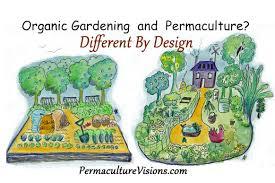
1 note
·
View note
Text
Christmas is fucked up in general
Okay I didn’t want to hijack that offensive bacon aimed at Ramadan post because it’s not really respectful to divert the topic even momentarily...and so have made a separate post.
So
Christmas is just fucked up in general. You find a tree that you like and admire for it’s shape and then cut it down, drag it into the house where trees do not belong just so you can fling craft debris all over it to make it even prettier, then kill it by starving it to death. Depending on how much your average alcohol intake is, you might or might not nail it upside down on the ceiling. How. Why.
Hey, what does that have to do with Christmas anyway? There are no pine trees in Judea. Having one wasn’t even a thing until some German dude started the tradition because supposedly a monk saw the starlight through the trees and it reminded him of the star over Bethlehem so he decided to lug one into the monastery for all to see. Because...uhhh...baby Jesus wanted blood sacrifices for his birthday (which probably wasn’t even in December) And then later some guy wrote a bullshit story about a pine tree wanting to worship Jesus and being used to make the crucifixion cross. Trees are very religious. Jesus died for the sins of trees.
Also why are there so many Christmas carols/kids storybooks that involve snow? It hasn’t snowed in Judea since the last ice age. Climate change yes. Whopping great blizzards not so much. Used to be wet/dry seasons and fertile land year round, which convinced the entire population of Palestine God gave them a really sweet deal. People have been fighting over it since the dawn of history. I have a great number of theories about the significant natural events in biblical times and how they were interpreted. That’s a different post though.
Anyway Christmas trees. They were not a thing outside Germany/Austria until Prince Albert installed one in Buckingham palace and then evvvvvvvverybody wanted one. Any number of them set their houses on fire because before electricity they hung lit candles on the stupid things...and then when electricity DID come along, any number of them set their houses on fire because early lightbulbs used enough energy to overheat and blow up into smithereens, sending craft debris shrapnel and flaming tree bits everywhere. Victorians had no clue about the safety of new-fangled trendy “gotta-Have-it”s. Their inventive ways to off themselves is also a different post.
Even leaving out the breaking and entering bit, Santa actually did start out as a christian saint, but he still has an unhealthy obsession with stalking small children and keeps a list of approximately 2 billion and sends that creepyass Elf on a Shelf to SPY on them when he’s not peeking through their windows to watch them sleep off their hallucinogenic sugarplums. That’s voyeurism and probably something worse. I guess having Jesus come down the chimney and leave presents was just too weird. That’s kind of terrifying, actually.
Santa is the poster boy for Diabetes after living on nothing but cookies and milk. Not really the message you want to give your kids.
You bribe your children with candy to be good (understandable, I guess) Threaten them with getting nothing but charcoal if they’re bad (fucked up, but...okay..? Maybe?) and then if that doesn’t work, you tell them that if they don’t knock it off and behave a GIANT FUCKING GOATMAN WILL EAT THEM ALIVE ARRG A NOM NOM NOMNOM!! (THE FUCK IS WRONG WITH YOU)
Technically it’s not even our holiday, we just appropriated most of it from the druids the same way we appropriate everything. Holly. Ivy. Poinsettias (stole that from Mexico, actually) Yule logs. Mistletoe. Stolen stolen stolen. Holidays celebrating males spooge and females Aunt Flo didn’t sit well with early priests trying to keep the heathens under control so they retconned the symbolism.
You know I can’t think of any other religion that makes chocolate candy shaped and marketed as reindeer poop. Or handing your kids that much candy in one sitting. No wonder half the little white kids have ADHD, all that sugar gave them brain damage.
Don’t even get me started on Easter.
16 notes
·
View notes
Photo

Salgado, S. 2000. Exodes. France: Taschen
This essay will discuss the life of the photographer Sebastian Salgado. In a first part we will discuss about his childhood in brazil, in a second part his interest in humankind in photography, and the third part about his interest in nature.
Sebastiao Salgado, born February 8, 1944 in Aimorés, is a Brazilian and French documentary photographer and photojournalist. He was raised in a farm, were he had to work from a young age to help his family with the livestock. Being the only boy of a family of eight children, he had to do what was considered as a masculine job for his generation.
Once a year, he was living the farm during two month to bring the cattle to the slaughterhouse. Because he grew up surrounded by the forest and the animals, he always had a respect for the nature. At the age of fifteen, he decided to leave the farm and his family to go study in the city, where he follow economics courses at the University of Sao Paulo. He came out of college with a master degree in economics. At this era ,the Brazil know a industrial and economical development, that caused an increase of the radical party against the globalization. Concerned about the impact that it could have on the environment, Sebastian Salgado join the radical left party. After the coup d’etat of 1964, made by the army, and the establishment of a dictatorship of the right, it was the moment for him to leave Brazil. In 1969, he moved to Paris with his wife, Lélia Wanick, to finish his studied, he started an agricultural Ph.D at the ENSAE, the national school of statistic and economic administration. In 1971, he is recruited by the International Coffee Organization in London to work as an economist. His work made him traveled a lot in Africa, where he started to shoot his first photographs.
After two years, he decided with his wife to both quite there job, and spending all their saving into photographic equipment. They moved back to Paris, and Salgado start to take pictures of wedding, portrait and nude of people, before to work as reporter for different agencies, like Sygma, Gamma and Magnum . He decided to only work on subjects that were important for him . « My photography is ethically and ideologically consistent with who I am » (Le sel de la Terre 2014)
In his photograph, he depicted the diversity of human kind. He is portraying workers, farmers, children, war and famine victims. He decided that he will only take pictures in black and white, because he doesn’t know how to make photos with color. For him what is interesting with black and white, is that the viewer will not be disturb by the color, and will only focus only on what really matter.
After being encouraged by his wife, he make the decision to do his first photographic project called Other Americas. This project will last 7 years, Salgado will traveled in South America to portrayed farmer and Indian population. He will travel in most of the South American country, from all South America, from Mexico, Bolivia, Chili, Peru, Ecuador and Guatemala. In his work, we feel the interest and love that he have for human. Salgado have spent a long time with the population that he had portrayed, for him it was important to understand how they were living, he was staying there for month to be accepted by them. « The strengh of portraits is this momentum where we understand a little bit more the life of that person tells with their eyes. When you make a portrait it
1 sur 4
is not you alone that take that picture, but it’s the person that offer the picture. » (Le sel de la Terre 2014)
His next project lead him to Sahel. Sebastiao Salgado associated himself with Médecin Sans Frontières, by creating a partnership with them. In 1984 he start his project in Ethiopia and continue in all the Sahel until 1986. He wanted to tell the story of starvation in the world, as he mentions in his documentary: « it was important to show that there was a enormous of humanity that was in an great distress and that it was more a problem of sharing, than a simple problem of natural disaster »(Le sel de la Terre 2014). Salgado saw during two years an entire population who were starving, but the actual reason of there death was all the disease that came along with. In one of his photograph we can see a man who is practicing a religious rite, despite the lack of water, he is using the small amount of water to wash his the body of his dead son. It is impressive to see that people who are living in inhuman condition, still believe and have faith in God. Hope was the only thing that kept this population a live, and give them strength.
In 1986 Salgado start a new reportages called La Main de l’Homme. During six years he will traveled in thirty different country to depicted the manual labor. He will took photograph of producteur of car in Calcutta, ship wrecker in Bangladesh, tea picker in Rwanda.
March 1991, Saddam Hussein set fire to 700 oil wells in Kuwaiti, due to his army retreat in the Persian Gulf War. Firemen from different country went to try to put out the fire. Salgado went there to report what he called an explosive job. He did not want to leave this infinite spectacle of light and sound. Birds couldn’t fly anymore their wings were glue together, some animals who did not runaway, where dying because they could not eat, everything was burnt, milles away from the actual event. The smoke was carrying the oils, it was spreading it everywhere around.
In 1994, is new project was called Exode. Salgado photographed what was a major subject at his era, the movement of people because of starvation or war, a main subject even nowadays. He want to light up the role of the marginalized, at a time where the country of Europe start to closed their border. He will go in Palestine, Irak, South America, but he will especially work in Africa. Most of the people who tried to runaway from misery and war, will end up in refugee camps, and will live there until their end. He saw the movement of Tutsis that were fleeing the Rwanda to go to Tanzania. He was the first to arrived on the spot, he had to report this horrible event, he saw quantity of body laying on the side of the road, it was 150 km of road, 150 km of dead people. He saw the genocide of the Tutsis, over 800 000 peoples died in three month. After this event he will have no face in the humanity, choked by the violence of human on his environment and on other.
During six years Salgado will tried to find a purpose to his life. In 2000 Salgado inherited his parents farm in Brazil. Due to the deforestation, Salgado no longer recognized the place where he grew up, from a forest which was covering 70% of the land in the 40’s, to 0,5% sixty years later. Then Sebastian and his wife decided together to replant the forest, by planting 2,5 millions of tree. To achieve there dream they created the association Instituto Terra, they went all around the world and organized auction, to collect money for their project. During the three first years they lost successively 80%, 60%, and 40% of their plants. But they never gave up, and thirteen years later, the result of their hard work was their.
2 sur 4
This project will help Salgado to find a new purpose in his live, and it will give him back a taste for photography. Salgado resume the photography after ten years of brake, with a new purpose, to show to the public that nature is part of our live and if we destroy it, we will destroy our self. During eight years he will travel in more than thirty trip, to photograph landscapes, mountains, animals, human community, oceans et deserts. This project was made to show the beauty of our planet, and show places that haven’t been destroyed by the human. He named this project Genesis, because he thought that in a certain way, he was going voyage back in time, place that have not change due to human behavior. He photograph the coexistence between human and nature. For him this project has been the most inspiring and fulfilling experience. After he spent years and years showing the most awful things made by the human, this project helped him too recovery from what he could have sawn in his life.
This photographer is inspiring for me because, he show is conviction and his thought threw his photographs, he doesn’t just take a pictures of somethings because he is told to, like most of journalism photographer, he take photograph of things that he find an interest in, he show us what he is, what he think, in his work. His photograph are full of emotions, they are really communicative. He is an example for because he spent twenty years taking pictures of horrible things done by the human, and was still going to other places to report events, and I could not spend more than a minute looking at his pictures. I admire him for his strength and is talent in photography, his black and white is incredible and his pictures are full of emotions, I wish that one day I could transmit emotions as much as he did.
0 notes